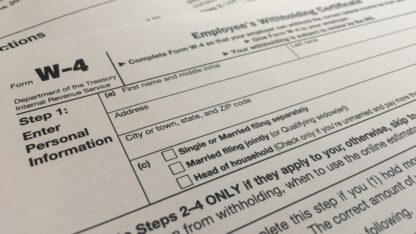Atlanta-area schools grapple with labor shortages
Metro Atlanta school districts are facing a shortage of workers. To speed up hiring, most school systems are offering financial incentives to bus drivers, substitute teachers, school nurses, and other employees.
For example, Cobb County recently used federal stimulus money to temporarily raise substitute teacher pay from $89 to $189 a day. Substitute nurses will get a raise of $4/hour. Bus drivers get a $1200 signing bonus. Most metro Atlanta districts are offering similar incentives for bus drivers, with hourly pay starting around $18/hour.
The Driver Dilemma
Georgia school districts have struggled with transportation costs for years. The state used to cover a larger percentage of those expenses, but in recent years, the bulk of the costs have been passed on to districts. According to the Georgia Budget and Policy Institute, in the 1990s, the state paid over 50% of school transportation costs. In 2020, it was 14%.
Joanna McFarland is the co-founder and CEO of HopSkipDrive, an organization that tracks school bus issues. She says districts need to start thinking about long-term solutions to the shortages.
“In the short term, we’re offering signing bonuses and hourly wages, but I think we have to realize fundamentally things have changed,” she says. “It takes a lot to become a school bus driver. It can take 10-12 weeks to go through the process.”
School bus drivers are required to have Commercial Driver’s Licenses (CDL). Some districts are offering to pay for that training. But McFarland says CDL drivers are in high demand.
“They can go drive for Amazon; they can go drive trucking,” she says. “And they’re going to make a lot more money and be able to work a lot more hours doing that.”
At a Sept. 13 school board meeting, DeKalb Superintendent Cheryl Watson-Harris said the district had 895 bus routes, 769 drivers, and 107 driver vacancies.
DeKalb’s shortage made the marching band at Chamblee Charter High School think they might miss their buses to a recent away game. Paula Emde is the president of the band booster board.
“We really, honestly did not know if our buses were going to come until they pulled in,” Emde says. “We had 56 kids in uniform, we had a U-Haul full of equipment, ready to go, and they showed up.”
Emde is considering leasing a coach bus for an upcoming band competition.
“We’re looking at paying anywhere from $1500 to $3000 to move the band that day, and it would cost a fraction of that if we had confidence that we could get a DeKalb County bus,” she says.
Root Causes
Education officials say there are several reasons for the shortages. Safety is often a concern for school bus drivers. In Clayton County, 17 bus drivers quit in the first month of school.
“They resigned because of uncooperative parents or students who were not wearing masks and they felt like their safety was being put at risk,” said Superintendent Morcease Beasley.
Childcare is another factor.
“Wherever there’s a shortage in either childcare or anywhere where a parent has to jump in to fill in that labor need, then one of the two parents has to fill in,” says Daniel Dench, an assistant professor at Georgia Tech’s School of Economics.
Dench says something else happened during the pandemic.
“When people were laid off, or they were furloughed, but they were backed up by some income from enhanced unemployment or the stimulus checks, they did realize how much they valued their life outside of work,” he says. “It could be that in coming back to work, they find the wages that they can pull are not high enough to compensate them for that.”
Dench says private sector wages have gone up, so workers have more options. To end the school staffing shortages, he says, districts need to offer employees more.
“I don’t think there’s a way around offering a better work experience or offering wage increases in the long run because the private-sector wage increases are not going away,” he says.
He says one benefit of higher private-sector salaries could be that they’ll generate more taxes, which will then go toward public schools.








